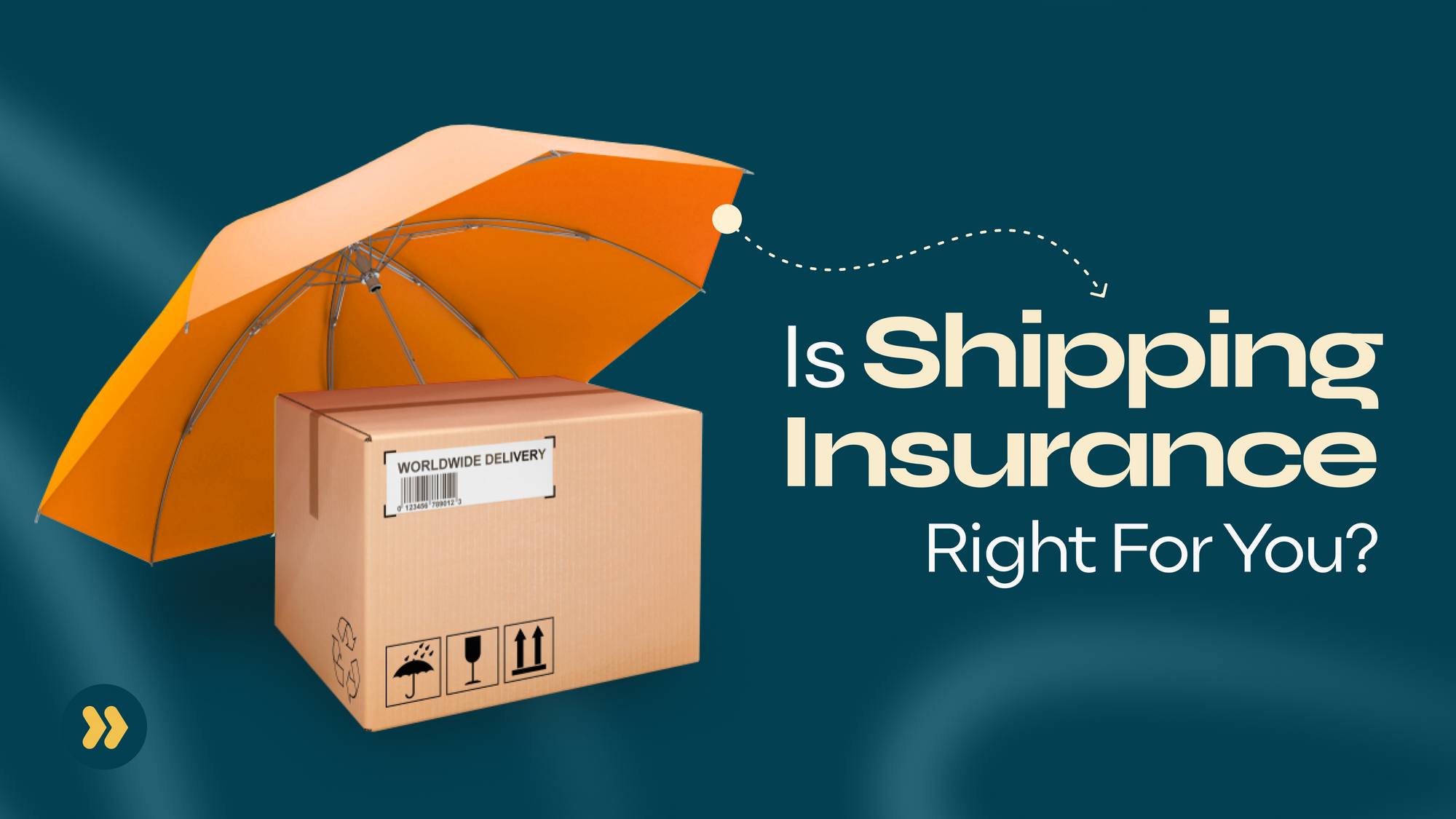Is Shipping Insurance Right For You?

Remember my cousin Oreva? I was with her on Monday when her goods arrived. We’ve been waiting for these items for the past three months, and they finally came. She was excited, but I watched her excitement dampen as we opened the cargo to discover that some items were already damaged and some were not packed. She called her carrier, and he told her off, saying nothing could be done as there was no insurance coverage on her items.
This was someone already complaining about the cost of running an eCommerce business, and now she has to deal with damaged goods as well. “Teejay, what is this shipping insurance? I have some lost packages, and they said I can't start a claims process. Please browse it and let me know what to do next time.”
This article will detail everything I told my cousin about shipping insurance. It will guide you through understanding shipping insurance, its misconceptions, what you need to know about the claims, and how to go about it.
Understanding Shipping Insurance
Shipping insurance is a type of insurance that covers the loss or damage of goods during transit. That is to say, with shipping insurance, you have a chance of recovering your goods if they are lost, stolen or damaged on their way to your destination.
Its purpose is to protect the sender and receiver of the goods from any loss or damage that might occur during the shipping process. You can equally call it a peace of mind fee as you’re rested knowing that anything can happen to your goods, and you won’t be at a loss.
While it is peculiar to major shipping carriers, insurance can be purchased by both buyers and sellers, individuals and businesses. The costs are determined mainly by the value of shipped goods, the destination and the shipping method used.
Without shipping insurance, the sender or receiver of the goods could be left with a significant financial loss if the shipment is lost or damaged. Shipping insurance can also help reduce the risk of disputes between the parties involved in the shipping process, as it provides a clear understanding of who is responsible for any losses.
Common Misconceptions About Shipping Insurance
Like most other topics, shipping insurance has misconceptions that can lead to costly misunderstandings and missed business opportunities. Some of them include:
It is unnecessary.
Some people see shipping insurance as an unnecessary expense as the shipping company is already tasked with ensuring the goods are safely transported.
However, this is not always the case, as these shipping companies may have limited liability for lost or damaged goods. This shipping insurance provides additional protection for both the seller and the buyer.
It is too expensive.
As with insurance, there's the misconception that shipping insurance is expensive. The cost of shipping insurance depends on the value of the goods, the destination and the shipping method used.
But then, it is relatively affordable, and its benefits outweigh the value of the shipped goods, making it a worthwhile investment for anyone who has to ship items regularly.
It is only needed for international shipments.
Some believe shipping insurance should only be used when international shipments are involved. Domestic shipments can also be lost or damaged during transit, and shipping insurance can help to protect the sender and receiver of the goods in these situations as well.
The Importance of Shipping Insurance
Shipping insurance can be vital for carriers and buyers who must get their items shipped. Its importance includes
Protecting against unforeseen events.
Shipping insurance is crucial to any shipping process as it protects against unforeseen events. It is essential to consider purchasing shipping insurance to protect your goods during transit. This protection is essential for high-value items, fragile goods, or goods transported internationally.
Reducing financial loss in case of damage or loss.
Shipping insurance also mitigates financial loss in case of damage or loss. Accidents can happen at any time, and it is necessary that you are prepared for them. Shipping insurance provides a safety net that helps cover the cost of any damage or loss, ensuring that you do not suffer financial loss.
Providing peace of mind for both sender and recipient.
In addition to financial protection, shipping insurance provides the sender and recipient peace of mind. Knowing that the goods are insured against unforeseen events can reduce stress and anxiety during shipping. This allows both parties to focus on other aspects of the shipping process, such as tracking the shipment and ensuring it arrives on time.
Reduced Business Uncertainty.
Insurance provides a safety net, reducing uncertainty and financial risk associated with shipping valuable goods.
Enhanced Customer Confidence.
Offering insured shipping can increase customer trust and satisfaction, as it demonstrates a commitment to the safe and secure delivery of products.
Protection of Brand Reputation.
Public perception of a brand can be severely affected by lost or damaged goods incidents. Shipping insurance helps safeguard brand reputation by ensuring reliable and secure delivery.
Strategic Advantage.
Businesses that offer shipping insurance may gain a competitive edge over those that do not, attracting customers who prioritize added protection for their purchases.
How Shipping Insurance Works
To access shipping insurance, it is essential to note that this is how it works in most cases.
Coverage options and limitations.
Shipping insurance can be obtained through a carrier or a third-party insurance company. Typically, carriers offer a basic level of coverage, but it may not be enough to protect the value of the goods being shipped fully. Third-party insurance can provide additional coverage, often including options for higher limits and specialized coverage for specific goods.
When purchasing shipping insurance, you should carefully review the terms and conditions of the policy. This includes understanding the coverage limits, deductibles (the amount paid from the pocket before the insurance covers the rest), and exclusions (items not covered by insurance). You should also adequately document the condition and value of the shipped goods, as this information will be required to file a claim in case of loss or damage.
Claims process and requirements.
In the event of a loss, the process of filing a claim can vary depending on the carrier or insurance company. Generally, the claim must be filed within a specified time frame and include documentation of the loss or damage and evidence of the value of the goods. Once the claim is approved, the insurance company will reimburse the value of the goods up to the coverage limit specified in the policy.
Cost-Benefit Analysis
When to Consider Shipping Insurance
While shipping insurance may seem unnecessary, there are several situations where it is wise to consider purchasing shipping insurance.
High-value Items.
It is important to consider shipping insurance if you ship high-value items like electronics or jewelry. These items are at a higher risk of theft or damage during transit, and the cost of replacing them can be significant. By purchasing shipping insurance, you can protect yourself from the financial loss of a damaged or lost item.
International Shipments.
If shipping internationally, You should consider purchasing shipping insurance. International shipments are subject to additional risks, such as customs delays and damage due to long transit times. In addition, international shipping carriers may not be as reliable as domestic carriers, making your package more likely to be lost or damaged in transit.
Fragile Items.
If you are shipping fragile items, such as glassware or artwork, it is important to consider purchasing shipping insurance. These items are at a higher risk of damage during transit, and the cost of repairing or replacing them can be significant. By purchasing shipping insurance, you can protect yourself from the financial loss of a damaged item.
Time-Sensitive Deliveries.
Expedited shipments or those with tight deadlines benefit from insurance. If a delay or incident occurs, insurance can help cover re-shipping costs or other necessary measures to meet the deadline.
Shipping internationally with Heroshe
Heroshe stands out as a reliable shipping service facilitating shipments from the USA and UK to Nigeria and Ghana, ensuring a hassle-free delivery process. Whether you're a business owner or an individual looking to send goods across continents, Heroshe provides a trusted solution for your shipping needs.
Does Heroshe Offer Shipping Insurance?
Absolutely. Heroshe understands the importance of safeguarding your shipments. However, you must report any loss, theft, or damage within 72 hours after you receive your package to get a full refund for your item.
What Happens if My Goods Get Missing in Transit?
In the rare event that your goods go missing during transit, Heroshe takes the necessary steps to address the situation promptly. This includes taking full responsibility for it.

Are My Fragile Items Safe with Heroshe?
Absolutely. Heroshe understands that fragile items require special care and attention during transit. We have established protocols and packaging standards to ensure that fragile items are handled with the utmost care. We charge an optional fee for crating fragile items such as TV, Large Screen Monitors, Glass Furnishings, Glass Items, Wine, etc. You will be notified via email or phone if we receive a fragile item at the US warehouse that needs crating.
Conclusion
In conclusion, whether or not shipping insurance is right for you depends on various factors. If you are shipping high-value items, fragile objects, or items prone to damage during transit, invest in shipping insurance or ensure your carrier offers insurance. Whether or not to purchase shipping insurance should be based on your individual needs and circumstances.
And if you ever decide to ship items from the UK and the USA, Heroshe offers a service laced with love and swift delivery, ensuring that your items get to you safely.
If you haven't already, I invite you to sign up on Heroshe today and experience hassle-free shipping.

